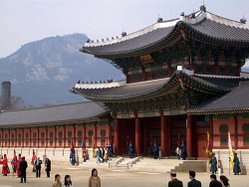Tuesday, December 05, 2006
Monday, December 04, 2006
Friday, March 17, 2006
Visit My Personal Blog Instead
Please visit my personal blog at http://edwinheng.blogspot.com instead.
The Symphony Band will also be having our annual Aesthetique Concert at Victoria Concert Hall on 15 April (Sat) 7pm. Come as a class and rally up the CH spirit, and enjoy a great evening of good music. Orchestral and Pop pieces, with percussion stomp as well. Tics at $10 and $15, free seating... sms/msn me or order from any of the band students.
Cheers ...
Monday, February 27, 2006
A Tribute to Mr S Rajaratnam
It truly dawned upon, me, even as I was emphasising on the life and contributions of Mr S Rajaratnam, that indeed, this is history in the makiing. Mr Rajaratnam will come to occupy in the hearts and minds of Singaporeans the very same position that the founding fathers of the United States - Jefferson, Washington, Adams, Franklin, Madison, Hamilton and many others - occupy in that of the Americans. And even as the Americans revere their Declaration of Independence, the 'We The People', we reaffirm today our founding fathers' aspirations for our nation, in our National Pledge, our own 'We The Citizens'.
Indeed, Mr Rajaratnam was a man of ideals, a staunch fighter for what he believed was right and just. The Singapore Pledge, simple in its very words, manifests and extols the very beliefs and principles of foundation for our nation - that we are one united people, that we will not and never shall be bound or segregated by race, language or religion, that we will build a democratic society, that we will honour justice and equality, so as to achieve our dreams of happiness, prosperiy and progress, all these for our nation. Such are the words of simplicity and with such alacrity, yet there is such immense depth in their connotations! These words penned by Mr Rajaratnam are the simple and pure embodiments of all our beliefs, faith, and aspirations for our young nation. Having undergone such a tumultous time in the riots and our eventual separation from Malaysia, he would craft a pledge that never again would our social fabric be torn, never again would our peoples be in disarray, and in freedom and dignity would we as a new nation pursue Man's basic right for happiness.
We are simply awed and greatly humbled when we take a closer look at the Pledge that we recite daily, for it represents the ideals of a generation for our nation.
And Mr Rajaratnam never wavered in his beliefs or ideals. Such was his strength of character and sense of purpose. With great courage and faith, he acted on his ideals for a greater good, for our common betterment. Truly, he belonged to a generation past, and he epitomised an era when thoughts mattered, beliefs mattered, values mattered, ideals mattered, acts mattered, and aspirations mattered.
This day, we salute Mr S Rajaratnam, former Deputy Prime Minister and founding father of Singapore.
Afterthoughts ...
Was sharing about another great American President - President Kennedy - always to be associated with that immortal line from the musical Camelot:
Don't let it be forgot,
that once there was a spot,
for one brief shining moment
that was known as Camelot.
Saturday, January 28, 2006
Chinese New Year in London, New York and Sydney
 London, one of my favourite cities, is all geared up for a China In London 2006 season, organised by London's Chinatown Chinese Association, the Royal Academy of Arts and Visit London.
London, one of my favourite cities, is all geared up for a China In London 2006 season, organised by London's Chinatown Chinese Association, the Royal Academy of Arts and Visit London.First off this Chinese New Year celebration, the Mayor of London Ken Livingstone officiated at the lighting up ceremony of the huge red Chinese lanterns along the premier shopping Oxford Street. He pronounced, "We want Londoners and the capital's visitors to sample just a little of that vast country's rich cultural history."
The Chinese New Year celebrations proper in London commences with a parade, fireworks, and other festivities in Chinatown, Leicester Square and Trafalgar Square on Sunday, January 29 2006. It also launches the China in London 2006 3-month season, which includes landmark cultural and historical exhibitions at the London museums, performances at the Royal Opera House, Covent Garden, and other programmes. The CNY programmes are organised with support from the Chinese Embassy, Arts Council England, the Mayor of London, Westminster Council, Metropolitan Police and others. (Picture of lantern in Trafalgar Square from BBC website)
More interesting information and news regarding CNY in London are available at the BBC website:
http://www.bbc.co.uk/london/features/events/chinese_new_year/
 Elsewhere, such as in Sydney and New York, CNY festivities are underway, celebrated in style. The New York Empire State Building is specially lit for the occasion, while major fairs, performances and parades are part of Sydney's official CNY celebrations organised by the Sydney city administration. According to the official spokespersons of Sydney city, the Chinese New Year is the second most important and celebrated public holiday there, after New Year's Eve, joined in celebrations by all people. (Picture of Empire State Building from Sina news website.)
Elsewhere, such as in Sydney and New York, CNY festivities are underway, celebrated in style. The New York Empire State Building is specially lit for the occasion, while major fairs, performances and parades are part of Sydney's official CNY celebrations organised by the Sydney city administration. According to the official spokespersons of Sydney city, the Chinese New Year is the second most important and celebrated public holiday there, after New Year's Eve, joined in celebrations by all people. (Picture of Empire State Building from Sina news website.)Article regarding Empire State Building:
http://news.sina.com.cn/w/2006-01-28/14548103367s.shtml
FOOD FOR THOUGHT:
What do you think are the underlying driving forces in the current global recognition of Chinese cultural heritage and festivals?
Wednesday, January 18, 2006
POSTLUDE to 'Winter's Roads' and REMINDERS

'WINTER'S ROADS' [See Post Below]
MORE QUESTIONS TO PONDER UPON
Having written your reflection essays on the Poem 'Winter's Roads', it is perhaps appropriate now that you ponder upon the following questions (to be discussed in class):
1) In our life journeys, will slowing down one's pace of life and smelling the roses along the way not distract us from a more purpose-driven life? Will it not result in a lazy and laidback lifestyle that will assign us to the category of the 'non-achievers'?
2) What do you understand by the concept of 'smelling the roses in life's journey', and the concept of 'embracing and enjoying life'?
3) How can we live LIFE to the fullest, so that we would not lament, when we die, that we had not lived?
REMINDERS:
PLEASE do remember to register (free) for the online edition of the New York Times (www.nytimes.com) if you have not done so.
PLEASE do regularly browse and select articles for more in-depth mulling over in the online versions of the New York Times (www.nytimes.com), BBC News (news.bbc.co.uk), CNN News (www.cnn.com) and Channel News Asia (www.channelnewsasia.com.sg).
You have to INDEPENDANTLY keep abreast of world current affairs, and develop your individual intellectual maturity.
remember ... FOCUS
EdwinHeng
Monday, January 09, 2006
LES MISERABLES ... Imageries in the musical

Les Miserables, written by Victor Hugo, is one of the greatest literary works of the western canon. It has been successfully presented as one of the longest running musical of the same name, running continuously for 20 years in the West End (London) and Broadway (New York), as well as resident and touring productions all over the world.
Story Synopsis and more are available on the official website of Les Miserables The Musical.

Victor Hugo was the greatest French writer who ever lived, revered by both the French nation and the world. His greatest works include 'Les Miserables' and 'The Hunchback of Notre Dame'. Hugo died in 1885 at the age of eighty-three. Although he left instructions that his funeral be simple, over 3 million spectators followed his cortege to the Pantheon, where he was buried amid France's great men. Hugo's death came at the end of a century of war, civil conflict, brutally repressed insurrections such as the student rebellion in Les Misérables, and social injustice. Because of his belief in the triumph of good over evil and his pleading for tolerance and non-violence, Victor Hugo was the herald of the new democratic spirit.
ACTIVITY:
For the following song numbers from the musical Les Miserables, examine and appreciate the figurative expressions and imagery presented about love/romance and friendship in the lyrics.
A Mother's Love: Come To Me (Fantine's Death)
http://les-miserables-lyrics.wonderlyrics.com/Come-To-Me-(Fantine's-Death).html
Fantine entrusts Cosette to M. Valjean on her deathbed, with all her hopes and aspirations for her beloved child.

Unrequitted Love: On My Own (Eponine) Eponine sang of her unrequitted love for Marius, as she paced the loneliness of the night.

Final Love at Death's Side: A Little Fall of Rain (Eponine/Marius) Eponine risked her life to bring news to Marius, dying in the arms of her beloved. Pain and rain intertwined amongst the emotions of both Eponine and Marius in this bittersweet scene.

A Father's Love: Bring Him Home (Valjean) Valjean saved Marius from the clutches of death in the aftermath of the Revolution. Marius had little life left in him, and Valjean prayed in supplication to God that Marius, the beloved of his daughter Cosette, might live.

Of Friendship In The Last Days
Drink With Me (Students) The student rebels passed their final night before the attack drinking to their friendship and to the passing of innocence and a life gone by, for none knew if each will witness the coming of the next day after the revolution.
Empty Chairs At Empty Tables (Marius) In the days after the failed Revolution, and after his recovery, Marius revisited the site where he had drunk the last drink with his brother comrades that night before the attack. The sight of the empty chairs and empty tables provided a poignant backdrop to his reminiscence.

Passion & Compassion for Humanity:
Human Dignity and Freedom
Do You Hear The People Sing (All) As the revolution gained momentum, the people at the barricade chorused their hopes for dignity, freedom and libertie la France - pouring forth their heartfelt pride and love for their nation. The fire in their hearts burned with a fury and passion that they would willingly lay down their lives as martyrs for their aspirations for the motherland.
Epilogue (All) The revolution had failed, and in this final epilogue scene, the martyrs and the survivors sang in a common spirit of the everlasting legacy of a national freedom that they leave behind. It was a failed revolution, but it was not a lost cause.

all pictures are taken from the lesmis official website www.lesmis.com
EBook Download Site: Gutenberg Project (http://www.gutenberg.org/etext/135)
Extract from Les Miserables (translation), final paragraphs:
In the cemetery of Pere-Lachaise, in the vicinity of the commongrave, far from the elegant quarter of that city of sepulchres,far from all the tombs of fancy which display in the presence ofeternity all the hideous fashions of death, in a deserted corner,beside an old wall, beneath a great yew tree over which climbs thewild convolvulus, amid dandelions and mosses, there lies a stone. That stone is no more exempt than others from the leprosy of time,of dampness, of the lichens and from the defilement of the birds. The water turns it green, the air blackens it. It is not nearany path, and people are not fond of walking in that direction,because the grass is high and their feet are immediately wet. When there is a little sunshine, the lizards come thither. All aroundthere is a quivering of weeds. In the spring, linnets warble inthe trees.
This stone is perfectly plain. In cutting it the only thoughtwas the requirements of the tomb, and no other care was taken thanto make the stone long enough and narrow enough to cover a man.
No name is to be read there.
Only, many years ago, a hand wrote upon it in pencil these four lines,which have become gradually illegible beneath the rain and the dust,and which are, to-day, probably effaced:
Il dort. Quoique le sort fut pour lui bien etrange,
Il vivait. Il mourut quand il n'eut plus son ange.
La chose simplement d'elle-meme arriva,
Comme la nuit se fait lorsque le jour s'en va.
He sleeps. Although his fate was very strange,
He lived. He died when he had no longer his angel.
The thing came to pass simply,of itself,
as the night comes when day is gone. (Translation)



